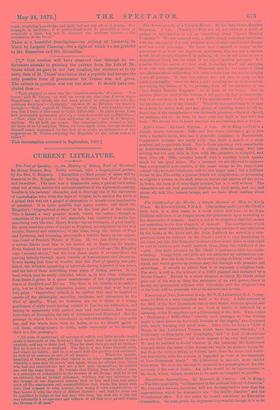CURRENT LITERATURE.
The Fool of Quality ; or, the History of Henry, Earl of Moreland. By Henry Brooke, Esq. Newly revised, with a biographical preface, by the Rev. C. Kingsley. (Macmillan.)—Most people of sense will be thankful to Mr. Kingsley for having disinterred the Fool of Quality and its author. The man was a memorable man, a genius born some- what out of time, amidst the conventionalities of the eighteenth century, lovable in his personal character, and in theology one of the succession ,of AssisweshOpe, who, from the days of Origen, have carried the torch of a gospel that was not a gospel of damnation to ninety-nine hundredths of mankind. It is quite possible that many readers will think Mr. Kingsley's "biographical preface" to be the best part of the volume. 'This is indeed a very graphic sketch, which the author, though he complains of the poverty of his materials, has contrived to make into something very life-like. Henry Brooke was an Irishman, of good family. He spent some ten years of his life in England, mixing there in the best society, literary and otherwise, of the time, being the friend of Pope and Lyttleton, and becoming afterwards a notable figure in the opposi- tion Court of Frederic Prince of Wales. Ile was just thirty-two when a serious illness sent him to his native air of Rantavon for health. From Ireland he never returned, living to a good old age (Mr. Kingsley says "seventy-seven," but his own dates make it seventy-five), but passing latterly through much trouble of bereavement and otherwise. It was during this time of trouble that the Fool of Quality was pub- lished, the volumes appearing at intervals during a period of ten years, and the last of them exhibiting some signs of failing powers. It is a book which may be easily ridiculed, which is, in fact, often ridiculous. Sometimes it gives us a queer reminiscence of the Cyropcedia, some- times of Sandford and Merton. The hero is too lovable to be called a prig, but he is the most impossible young creature that ever was put into print. 'Impossible,' indeed, is an epithet that may be applied to nearly all the philosophy, morality, incidents, and characters in the Fool of Quality. What, for instance, are we to think of a young gentleman of eight years having related to him for his edification, and taking in apparently with perfect ease and satisfaction, that famous love-story of Xenophon, the tale of Arimaspes and Panthea ? But the passage in which this is introduced is, notwithstanding, a very noble one, and the whole book, with its faults, or as we should prefer to call them, strangenesses, is noble, noble especially in its theology, Here is a fine passage,:—
" All sorts of sectarians, all persons of selfish and little minds, would make a monopoly of the Saviour ; they would shut him up into a con- venticle, and say to their God, Thus far shalt thou go, and no further.' But he is not to be so confined. The Spirit of our Jesus bloweth.wide, and where he listeth ; and he is at once both the purifier and redeemer,
as well of all nations, as also of all nature When the Apostle, speaking of Christ, affirms that there is no other name under heaven whereby a man may be saved,' and again, where he affirms that 'those who had not received the law are a law unto themselves,' he intends one and the same thing. He intends that Christ, from the fall of man, is a principle of redemption in the bosoms of all living; that he is not an outward, but an inward redeemer, working out our salvation by the change of our depraved nature,' that in him and from him alone arise all the sentiments and susceptibilities that warm the heart with love, that expand it with honour, that wring it with compunction, or that heave it with the story of distant distress ; and that he alone can be qualified to judge at the last day, who from the first day to the last was internally a co-operator and witness of all that ever passed within the bosoms of all men."


































 Previous page
Previous page